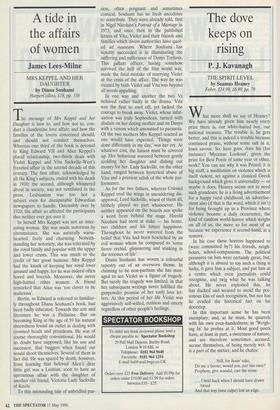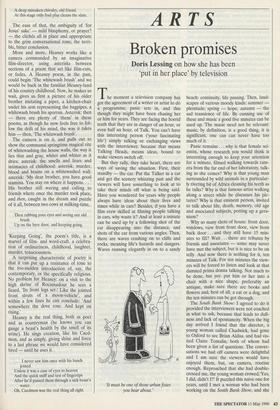The dove keeps on rising
P. J. Kavanagh THE SPIRIT LEVEL by Seamus Heaney Faber, £14.99, £6.99, pp. 70 What more shall we say of Heaney? We have ;already given him nearly every prize there is, our white-haired boy, our national treasure. The trouble is, he gets better, and this is indeed a trouble because continued praise, without some salt in it, loses savour. So, here goes: does his (for instance) `Mycenae Lookout', given the prize for Best Poem of some year or other, work? You can see why it was Prized; it is big stuff, a meditation on violence which is itself violent, set against a classical Greek background which gives it universality — or maybe it does. Heaney seems not to need such grandeurs, he is a living advertisement for a happy rural childhood, an advertise- ment also (if that is the word, which it isn't) for being brought up in a Province where violence became a daily occurrence, the kind of random world-horror which weighs on all of us, the more so for most of us because we experience it second-hand, at a remove.
In his case these horrors happened to (were committed by?) his friends, neigh- bours, school-companions. The political pressures on him were certainly great, but, although it is absurd to say such a thing is lucky, it gave him a subject, and put him at a centre which even journalists could recognise, and twig what he was talking about. He never exploited this, he has ducked and weaved to avoid the poi- sonous kiss of such recognition, but nor has he evaded the historical fact on his doorstep.
In this important sense he has been exemplary, and, as he must, he quarrels with his own even-handedness; in 'Weigh- ing In' he probes at it. Most good poets have, at least in part, a sweetness of nature, and are therefore sometimes accused, accuse themselves, of being merely wet. It is a part of the métier, and he chafes:
. . . Still, for Jesus' sake, Do me a favour, would you, just this once? Prophesy, give scandal, cast the stone.
. . . I held back when I should have drawn blood
And that way (mea culpa) lost an edge.
A deep mistaken chivalry, old friend.
At this stage only foul play cleans the slate.
The ease of that, the ambiguity of 'for Jesus' sake' — mild blasphemy, or prayer? — the clichés all in place and appropriate to the grim conversational tone; the terri- ble, bitter conclusion.
More and more, Heaney works like a camera commanded by an imaginative film-director, using asterisks between sections of a poem that act like film-cuts, or fades. A Heaney poem, in the past, could begin 'The whitewash brush' and we would be back in the familiar Heaney-land of his country childhood. Now, he makes us wait, gives us first a picture of his older brother imitating a piper, a kitchen-chair under his arm representing the bagpipes, a whitewash brush his sporran. Asterisk: then — there are plenty of `then' in these poems, as though he now feels free to fol- low the drift of his mind, the way it takes him — then, 'The whitewash brush'.
The camera is on it, and pulls out to show the communal springtime magical rite of whitewashing the house walls, the way it lies thin and gray, whiter and whiter as it dries: asterisk: the smells and fears and intimacies of childhood: asterisk: murder, blood and brains on a whitewashed wall: asterisk: 'My dear brother, you have good stamina. You stay on where it happens. . . ' His brother still waving and calling to friends where once the murder took place, and then, caught in the dream and puzzle of it all, between two cows' at milking-time,
Then rubbing your eyes and seeing our old brush Up on the byre door, and keeping going.
`Keeping Going', the poem's title, is a marvel of film- and word-craft, a celebra- tion of ordinariness, childhood, laughter, murder, tenaciousness.
A surprising characteristic of poetry is that it can put up a resistance of tone to the too-sudden introduction of, say, the contemporary, or the specifically religious. No problem for Heaney: on a visit to the high shrine of Rocamadour he sees a lizard, 'Its front legs set / Like the jointed front struts of a moon-vehicle', and within a few lines he can conclude: 'And somewhere the dove rose. And kept on rising.' Heaney is the real thing, both as poet and as countryman (he knows you can gauge a beast's health by the smell of its urine). He sings creation, like his Caed- mon, and as simply, giving shine and force to a last phrase we would have considered tired — until he uses it.
. . . I never saw him once with his hands joined
Unless it was a case of eyes to heaven And the quick sniff and test of fingertips After he'd passed them through a sick beast's water.
Oh, Caedmon was the real thing all right.



































































 Previous page
Previous page